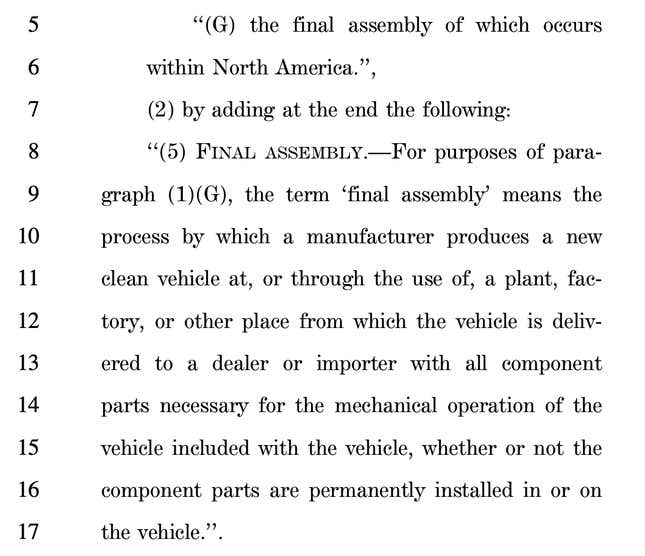
Do you remember the good old days of last week, when buying an EV meant you got a cool $7,500 back on your taxes? It was a great system: You bought a shiny new car, and Uncle Sam took some of the financial hit off of you, when you did file your taxes. The key word, however, is was — as fossil fuel millionaire Joe Manchin just took all that away.
I’ll admit, the old EV tax credit wasn’t perfect. It assumed that the car’s manufacturer hadn’t yet sold 200,000 EVs (best of luck to whoever bought the 200,001st of any given brand), and that you actually earned enough in a year to owe $7,500 in taxes ($9,175 more per year than the median American income). It required you to wait until tax time to see the fruits of your purchase, meaning it didn’t hurt the sting of that down payment. But it did do one thing right: It subsidized the transition to EVs, by making them more attainable for a broader swath of the American public.

Last night, the Senate passed a new version of the $7,500 EV tax credit as part of the Inflation Reduction Act. The exact current text that passed is a little tricky to come by, thanks to a flurry of last-minute amendments, but multiple versions seem to stay true to the same tax credit wording — wording that disqualifies a lot of EVs.
Immediately after the Act’s passage (meaning another House vote and an autograph from the President), all EVs that don’t undergo “final assembly” in the U.S., Mexico, or Canada will be disqualified from any tax credit eligibility. No Subaru Solterra, no Toyota bZ4X, no Kias or Hyundais. There are shockingly few electric vehicles made or completed in North America, which means shockingly fewer customers will see their discount.

Now, sure, you could argue this is a good thing. After all, we’re all about reducing inflation, right? What better way to do that than by encouraging domestic job production? Well, for starters, job production isn’t the cause of the inflation spike we’re seeing, and a lack of European and Asian free trade agreements with the U.S. means that most of those new jobs are likely headed to Mexico.
Currently, the fiscal tradeoff with EVs is pretty simple. A higher initial cost, driven by everything from skyrocketing lithium to paying off new tooling, but lower long-term operating costs — no more fuel, oil, or other engine-related consumables. The point of an EV tax credit is to ease that initial burden, making it more reasonable for more people to buy more electric cars. The point is not to make everyone buy a Bolt.

Automakers see the problem here, with few cars qualifying for the updated tax credit and none qualifying when more restrictions kick in a few years down the line. I generally dislike agreeing with industry lobbying groups, but this is an enemy-of-my-enemy situation. When they’re right, even for the wrong reasons, they’re right.
The new tax credit may benefit GM and Tesla, but it’s a detriment to most other EV makers. More importantly, it’s a detriment to EV buyers — putting more electric vehicles out of financial reach, in a time where the dollar doesn’t go as far as it used to. Fantastic vehicles like the Hyundai Ioniq 5 and Kia EV6 just got a massive price spike to the end consumer, even if their MSRP didn’t change.
So, God damnit, Joe Manchin. We could’ve had something good here. Hope the coal money was worth it.